Spring Into Action
Break days and other activities offer students lots of options in 2021
February 4, 2021
By
Tina Eshleman
and
Katherine Vermilyea '22
Engaging in memorable social activities is a key component of student life at William & Mary, but one that the pandemic has made far more complicated. How do you have fun, meet people and form meaningful relationships while wearing masks, gathering in small numbers and maintaining a 6-foot distance from others?
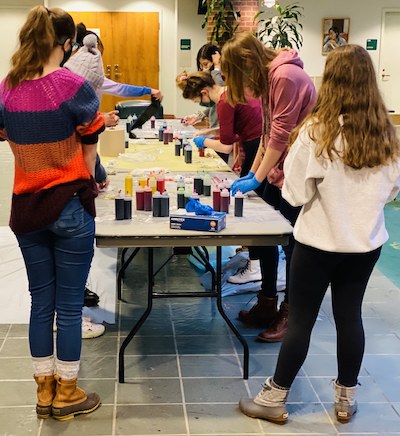
Thanks to the perseverance and creativity of university staff and student organizations, there are numerous ways to answer that question. An initiative called 20 Events in 21 Days, sponsored by Student Unions and Engagement, kicked off spring semester activities, and the TribeLink platform, comprising pages from every student organization, is filled with listings for events that can be searched by date, category and perks such as free food.
Through a partnership with Colonial Williamsburg, the ice skating season at Liberty Ice Pavilion has been extended through the end of February, with special W&M nights on Fridays featuring free skating and rentals for students from 7 to 10 p.m.
“We are so excited to have students returning to campus,” says Drew Stelljes Ph.D. ’07, assistant vice president of student affairs, student engagement and leadership. “They breathe life into the spaces. Their energy, creativity and drive activates our shared spaces — inside and outside.”
For the spring semester, new fire pits have been installed around the Sadler Center — along with pergola swings in iconic campus locations and additional Adirondack chairs — to encourage small outdoor gatherings, and tents continue to provide covered spaces, as well. Students who need warmer clothing to accommodate increased time outdoors are encouraged to contact the W&M Dean of Students Office for assistance.
In contrast to the compressed fall semester, a series of spring break days organized around the theme “Wellness Your Way” (a concept developed by students in the Wellness Ambassador program) will offer students opportunities to relax, connect with friends, join in service activities and outdoor games, and work together on social issues and sustainability projects. Following the Charter Day Adventure Race on Feb. 12, the next spring break day will be a Coffee & Connection day on March 4, a Justice & Community day on March 17, a Health & Wellness day on April 6, a Sustainability Day on April 7, and an event on April 26 planned by the office of Student Transition Engagement Programs (STEP, previously known as the First Year Experience) that focuses on students preparing for the next year and seniors transitioning to young alumni.
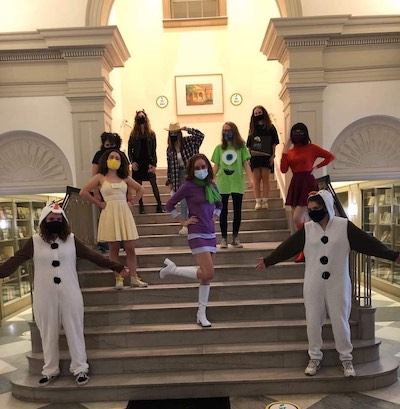
Event planning for spring builds on successes from the fall semester, such as an October festival with pumpkin painting, physically distanced a cappella singing, outdoor exercise classes, a book club for undergraduate military veterans and a mentoring program that matched 180 first-generation students with faculty and staff for academic and social support and career preparation.
"In the short term, it will be challenging with colder weather and less opportunity for outdoor connection,” says Anne Arsenau ’89, M.A.Ed ’92, director of student leadership development. “As the semester progresses, we hope to expand the guidelines for student organizations that will allow them more flexibility and opportunity for in-person connection.”
For the first half of the semester, activities will need to continue virtually or in small group settings, Arsenau says. Fortunately, William & Mary event and activity planners have proven to be skilled at adapting to changing circumstances.
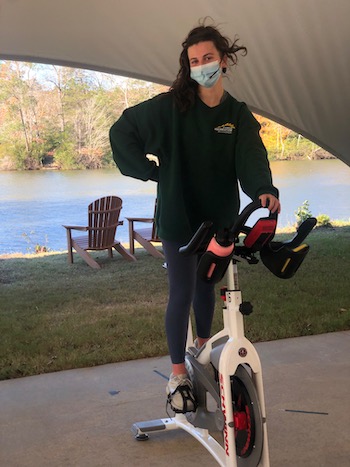
Campus Recreation offered FitWell classes — including yoga, cardio dance, Pilates, barre and more — both virtually and in-person during the fall semester. The Martha Wren Briggs Amphitheatre at Lake Matoaka was transformed from an events venue into a space for cycling and other classes.
“Prior to this past semester, I could count the number of times I ventured down to Lake Matoaka and the amphitheater on one hand,” says Campus Recreation instructor Kamila Mehdi ’21, a public health major and sociology minor. “There is something so refreshing about taking a class with the beauty and serenity of Lake Matoaka right in front of you.”
From classes with a Britney Spears theme to color-changing lights at night, Campus Recreation provided the fun of a typical semester along with the safety precautions necessitated by the pandemic. This spring, Campus Recreation plans to continue offering FitWell classes in a variety of formats and will use online signups to allow students to book 90-minute time blocks at the Bee McLeod Recreation Center. Outdoor classes are sure to continue long after the threat from COVID-19 has passed.
At the Shenkman Jewish Center, Friday night Shabbat dinners sponsored by William & Mary Hillel to observe the Jewish Sabbath transitioned last fall to a boxed meal — dubbed “Shabbox” — that students can order and pick up to take with them. The Shabbat meal typically includes meat, a side dish, vegetable and dessert, and involves saying a blessing over grape juice, with lighted candles and challah bread.
“Sabbath dinner is a big deal, and Jewish students are used to having a hot Shabbat meal,” says Rabbi Gershon Litt. “We could not do that once the pandemic started. The Shabbox is one mitigation we’re doing to allow Jewish students to feel connected. After the pickup, there’s a short program that the students lead, socially distanced and with masks. Some join in via Zoom, and some participate in person.”
The adaptation will continue on Fridays throughout the spring semester, Litt says.
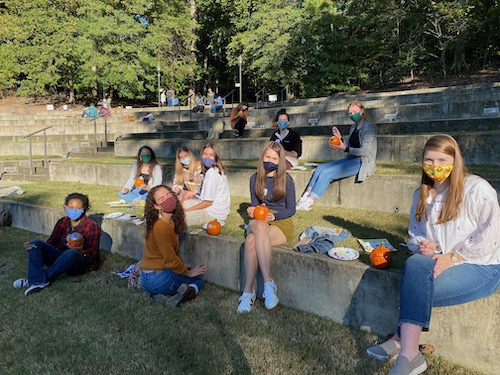
Because of restrictions on how many people could gather in one space, InterVarsity Christian Fellowship held two sessions for 50 students each during its September scavenger hunt, a new event the organization held at the Briggs Amphitheatre. Connor Clark ’16, an InterVarsity campus staff minister who works with undergraduates, says both sessions filled up, partly because students were eager for in-person activities.
“We met almost 100 students just through Instagram,” Clark says. “Students would tell their friends that they connected with a group that was holding events in person.”
This spring, Clark hopes to hold at least one InterVarsity outdoor event per month from February to May, such as stress-relieving activities and challenge games similar to “Minute to Win It.”
Williamsburg Engagement, a program of the Office of Community Engagement, gives students the opportunity to serve with local organizations by volunteering weekly with a specific nonprofit, also adapted its fall program to follow COVID-19 guidelines.
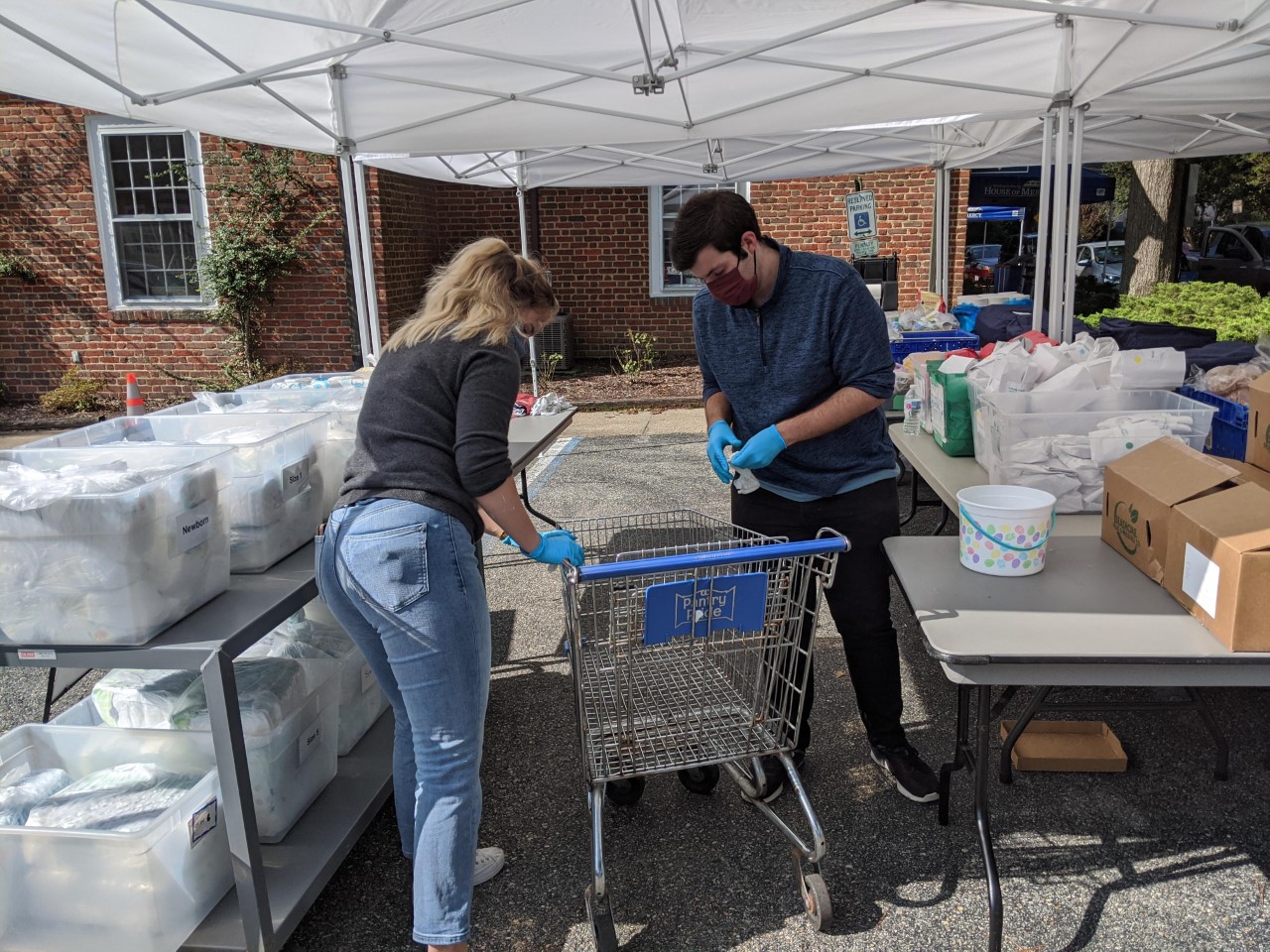
Tyler Stoner ’21 was part of a team partnering with the House of Mercy, right next door to the W&M campus. The team met every week for several hours to work at the nonprofit’s food pantry, which operated drive-through style. Stoner and the team from William & Mary worked at outdoor tables under a tent to assemble items for each guest, such as food, hygiene products and food for pets, and putting them into a cart. They would then leave the cart by the client’s car and retrieve and sanitize it after it was unloaded.
“We were vigilant about making sure that the team was safeguarding itself in every way possible,” says Stoner, a government major. “We did not enter the building, we socially distanced, and of course we sported masks for the duration of our service.”
Stoner and the other members of the Williamsburg Engagement team were motivated to serve the community last fall because of increased homelessness and food insecurity heightened by COVID-19.
“The disparity between the food that people need versus the amount that is available in the United States has grown substantially within the pandemic,” Stoner says. “We were able to directly witness how much the pandemic has challenged people.”
In addition to serving the local community, Williamsburg Engagement also provided its members with the opportunity to connect with each other during a time of great uncertainty.
“My experience volunteering at the House of Mercy this past fall was by far my favorite part of the week,” Stoner says. “Having no classes in person, I valued being able to interact, social-distanced, of course, in-person with my peers.”
A desire for connection with other students also fueled interest in William & Mary panhellenic sororities last fall. Traditionally, formal recruitment involves potential new members visiting all 10 of the chapters’ on-campus houses and allows them to meet as many panhellenic women as possible, learn about each individual chapter, the William & Mary panhellenic community, and the fraternity and sorority community at large. Because of COVID-19, panhellenic recruitment shifted to an all-virtual format over Zoom.
“Although I haven't experienced an in-person rush, I really enjoyed the Zoom format, mainly because I prefer one-on-one conversations. It also allowed me to focus on who I was talking to rather than being distracted by in-person factors,” says W&M Panhellenic Council Vice President Kimya Shirazi ’23, a member of Chi Omega. “I had memorable conversations with women from all of the sororities, and I connected with many women in person after rush, both from my sorority and the sororities I didn't end up joining.”
More women joined the panhellenic community last fall than during past several years, and there was a higher retention rate as well, Panhellenic Council leaders say.
“I think this past semester was a challenge in fostering connections, for any student organization,” says Panhellenic Council President and Pi Beta Phi member Carter Hall ’23. “But because people were so eager to form these connections, it made things like outdoor dinners with sisters or socially distanced yoga classes all the more special. Chapters and new members were really great about making the most of the in-person gatherings they were allowed to have.”
Like Shirazi, many students enjoyed aspects of the virtual recruitment elements, including more personal conversations and not having to deal with inclement weather.
Says Julia Murray ’22, vice president of recruitment and a member of Kappa Alpha Theta,
“Next fall, when – hopefully — COVID is over and everyone is vaccinated, regardless of the format, I hope to facilitate a recruitment that everyone feels comfortable with and that maintains the intimate connections facilitated by Zoom.”
Editor’s note: Katherine Vermilyea, an intern with University Marketing and Advancement Communications, is president of Kappa Alpha Theta.